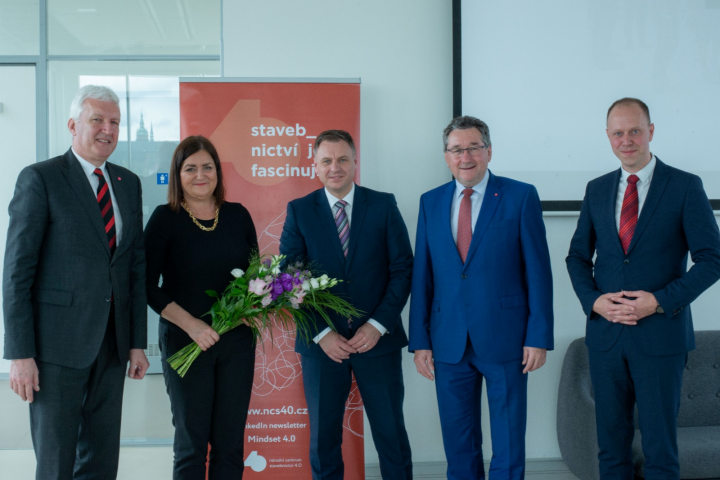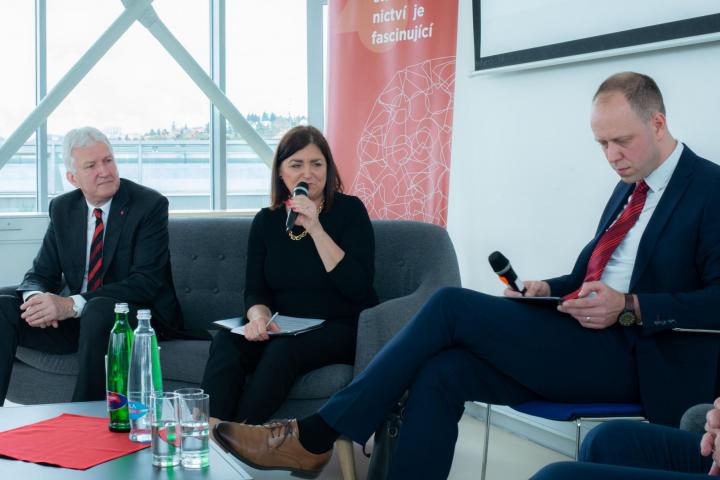The construction industry is an important pillar of the Czech economy, yet it does not yet make much use of the opportunities offered by current digital technologies. The industry could use innovation not only because it is fundamentally understaffed, but also to better, more efficiently or more sustainably manage the resources used by the construction industry and to respond flexibly to change. These and other topical issues were discussed by an expert panel, whose guests included not only Minister Helena Langšádlová but also the Dean of the Faculty of Civil Engineering of Brno University of Technology Rostislav Drochytka, the Chairman of the Board of Directors of TA ČR Petr Konvalinka and a member of the Supervisory Board of Hochtief Pavel Růžička.
The so-called industrial doctorates could also help link practice and research not only in the construction industry. Helena Langšádlová, Minister of Science, Research and Innovation, has long advocated their expansion in the Czech Republic. "It is very important that the results of our scientists are more widely appreciated and that there is greater coherence between research organisations and those who will use these results. Industrial doctorates will contribute to this. They strengthen the culture of transfer, which is still very low in the Czech Republic. If we manage to strengthen it, it will lead to significant technological change and thus to building an economy with higher added value, which is our goal."
Industrial doctorates are also one of the priorities of the Czech Institute of Informatics, Robotics and Cybernetics. "In cooperation with foreign universities, we want to create our own doctoral programme that would include industrial doctorates. A direct link to practice, innovation potential and financial benefits - this is how we envision a modernly conceived study that has something to offer to the academy, companies and especially to students," explains Ondřej Velek, Director of the Czech Institute of Informatics, Robotics and Cybernetics.
Putting innovation into practice is one of the goals of the National Centre for Construction 4.0, which connects partners from the corporate sector and other experts on campus. Although construction is a discipline where every building is individual and almost every element is different, making it fundamentally different from mass production like automotive, even in such a complex industry, it is possible to look for repeatability and focus the tools that Industry 4.0 can offer. "One of the challenges is construction robots," says Radoslav Sovják, director of the National Centre for Construction 4.0. "Such robots already exist, of course, and their use is not and probably never will be the same as on the production line in the automotive industry. Yet the transformation of the construction industry would greatly help the entire industry and bring in young people who are rather put off by the current image of the construction industry, which often relies on cheap labour. It is vital that the professional community agrees on a direction to move forward as an industry, not as individual groups. Energy and, by extension, investment is terribly fragmented in the Czech construction industry."
Rostislav Drochytka, Dean of Faculty of Civil Engineering of Brno University of Technology, emphasised the role of sustainability in the construction industry: 'Reducing energy consumption and the related reduction of the carbon footprint are among the areas where the impact of oriented research is most significant. This can be achieved either directly by producers or indirectly by using secondary raw materials. Knowing our carbon footprint will lead to active reductions in the future."
Pavel Růžička from Hochtief also confirms the need for active cooperation: "Scientific research projects allow for meaningful cooperation between scientific institutions and the private sector, which often has specific development requirements but lacks the necessary capacities."

